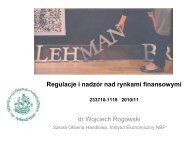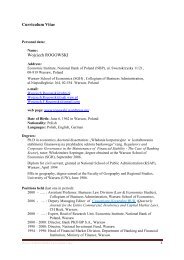EMERGING
Emerging Markets:
Emerging Markets:
You also want an ePaper? Increase the reach of your titles
YUMPU automatically turns print PDFs into web optimized ePapers that Google loves.
<strong>EMERGING</strong> MARKETS:<br />
A Review of Business and Legal Issues<br />
in placing child pornography on the Internet server which is accessible from almost any<br />
country of the world.<br />
Foresaid examples prove that development of such technologies as Internet change<br />
traditional understanding of territory and space. Internet binds computers of all its users in the<br />
integrated network that goes beyond conception of geographical borders. Erin L. Anselmo<br />
outlines that interrelation between addresses of Internet sights place an additional<br />
complexities in conception of territory in Internet. Due to the cross-references of Internet<br />
sights their division is conditional. Internet addresses are non-material, and even their URL<br />
indicators of the state (“.ua”, “.ru”, “.pl”) should not necessarily be exact 1 . This means that<br />
there is no strict relation between Internet addresses and their real geographical position.<br />
Addresses may stay invariable, at the time when servers may change their geographical<br />
location. So Internet as well as cybercrimes committed in Internet can’t be viewed in the<br />
notions of traditional conception of territory and space. It represents a separate virtual space<br />
that exists beyond a physical world, and therefore is often referred as cyberspace.<br />
3. Criminal jurisdiction and international norms concerning computer crimes’<br />
prosecution.<br />
Extraterritorial nature of Internet places a number of obstacles on effective control<br />
over cybercrime threats and creates conflicts of criminal jurisdictions. Cybercrimes hardly fit<br />
in to the conception of traditional principles of jurisdiction under International Law 2 , though<br />
international agreements concerning transnational crimes and practice of national courts still<br />
hold old formulas.<br />
systems worldwide. See: Shannon C. Sprinkel. Global Internet Regulation: The Residual Effects Of The<br />
"ILOVEYOU" Computer Virus And The Draft Convention On Cyber-Crime. 25 Suffolk Transnat'l L. Rev.<br />
491, p. 493 (2002).<br />
1 Erin L. Anselmo. Cyberspace in international legislature: Is territorial principle in International Law denied by<br />
the development of Internet? – Economic Strategies, 2006, №2. /<br />
http://www.inesnet.ru/magazine/mag_archive/free/2006_02/anselmo.htm<br />
2 Present system of international law is based on five theories of criminal jurisdiction identified in Harvard<br />
Research on International Law, 1935: territorial; protective; nationality; universal; and passive personality.<br />
See: Harvard Research in International Law, Jurisdiction with Respect to Crime, 29 AM. J. INT'L L. 474<br />
(1935).<br />
Page 87 Volume 1, April 2009




